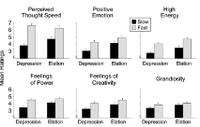Thinking Speed, Mood and Optimism

There’s a very interesting article at the Mixing Memory blog. It’s one of the blogs that I highlight in the “What I’m reading” section. The articles highlights some recent research by Emily Pronin and Dan Wegner from Princeton and Harvard respectively, entitled “Manic Thinking: Independent Effects of Thought Speed and Thought Content on Mood.”
It’s about an intriguing issue. People who have a manic illness have an acceleration of thinking processes together with elevated mood and energy level. Mania is also associated with racing thoughts grandiose or creative ideas, fast, uninterruptible speech, aimless pacing, irritability and an over-involvement in pleasurable activities, together with a loss of impulse control.
It may sound great, and initially people are often very happy to be manic. But after a while it can give way to exhaustion or the realization that some of their choices have been unwise. I once knew someone who was driving a brand new BMW – that she could definitely not afford – at over 120 miles an hour, the wrong way down Interstate 95. That’s when the police became involved, and they immediately realized that she was not a villain, but a very sick person who could have killed herself and a ton of other people.
The researchers they had a group of college undergraduates read a series of 58 emotion-inducing statements out loud, and to do it at either a fast or slow pace. The statements are emotionally neutral at the beginning and then become progressively more emotionally positive or negative. The idea is that reading a series of progressively more positive or negative statements will affect the reader’s mood. The letters in the statements were presented one at a time, either for 40 milliseconds per letter (“fast thinking” condition) or 170 milliseconds per letter (“slow thinking”). A pilot study indicated that the 40 milliseconds per letter reading time were about twice the normal reading speed for college undergraduates and 170 milliseconds were about half the normal speed. The time between statements also varied, with only 320 milliseconds between statements in the “fast condition” and 4 seconds between statements in the “slow condition.”
After reading all 58 statements, the participants were asked to answer a series of questions designed to assess their mood, energy level, feelings of power, creativity and inspiration. There were also questions to evaluate “grandiosity or inflated self-esteem,” together with their own perceptions of their speed of thought.
Subjects in the “fast thought” condition reported faster thought speeds than those in the “slower” condition. As predicted, faster thought speeds affected mood and mania-related feelings, participants in the fast thought condition reported being happier, had higher energy levels, experienced greater senses of power and creativity, and higher levels of grandiosity (though self-esteem did not differ between conditions). What is important, is that these effects were independent of the mood manipulation (positive or negative statements). Here is a graph from the paper presenting the effects of slow and fast thinking as a function of the type of sentence:

This study has some important implications. Thinking more quickly produces elevations of mood and self-perception that can smetimes be similar to those of very mild mania. I have seen this happen frequently when people have been up all night: the bright lights of morning and a few cups of coffee make them appear mildly manic. For a time they do in fact impress with their creativity and mastery not only of details, but of the “Big picture.” But as time goes on, much of their thinking turns out to be not altogether logical.
The study also raises the possibility that some manic symptoms may be produced by thinking. There is an old term from the psychoanalytic literature called “manic defense,” in which people use manic-like symptoms to protect themselves – or more accurately their ego structures – when under stress.
I have spent most of my life with people who think very quickly and accurately. Most also express themselves very well: both succinctly and fluently. But all have also known the importance of stopping for a while after a brainstorming session, so that we can see if our ideas have really born fruit, or if they just seemed a good idea at the time.
There is no question that moving and speaking more quickly can elevate our mood. It is no surprise that it has little impact on self-esteem. It is becoming more and more clear that self-esteem follows from genuine achievement. Boosting artificially is difficult, with one exception: when people have every reason to have decent self-esteem, but instead they keep feeling bad, as if they have a kind of leaky bucket as my friend the psychiatrist Stephen Preas calls it.
I remember an experiment in which an investigator was experimenting with ether. During one of his sessions he had a deeply felt mystical experience in which he was sure that he suddenly understood the whole of nature and reality. He immediately wrote it down so that he could show the world The Secret.
When he came back down to earth, he looked at what he had written, “The world is like a fish…”
“The world that we have created is a product of our thinking. It cannot be changed without changing our thinking.”
–Albert Einstein (German-born American Physicist and, in 1921, Winner of the Nobel Prize in Physics, 1879-1955
)
“Some would sooner die than think. In fact, they often do.”
–Bertrand Russell (Welsh Mathematician, Philosopher, Pacifist and, in 1950, Winner of the Nobel Prize in Literature, 1872-1970)
“Most people can’t think, most of the remainder won’t think, the small fraction who do think mostly can’t do it very well. The extremely tiny fraction who think regularly, accurately, creatively, and without self-delusion. In the long run, these are the only people who count.”
–Robert Heinlein (American Writer, 1907-1988)







Just a wish…
Your opinion on
the function of thinking speed in cognition…
May be abstraction???
May be regulating the mood?
May be adjusting the thinking depth???
Merci Monseur!!! Tres tres merci!
What an exceptionally interesting set of questions!
I think that the data most strongly supports the notion that thinking speed is related to abstraction: the fast thinker can examine more aspects of a problem, but there is almost certainly a “depth” issue as well. The quick thinker will likely also probe more deeply into each aspect.
From the small amount of data that we have, the effects on mood are most likely to be secondary.
There is some more research that should be out soon, and I shall report on it as soon as it arrives.
Kind regards,
RP